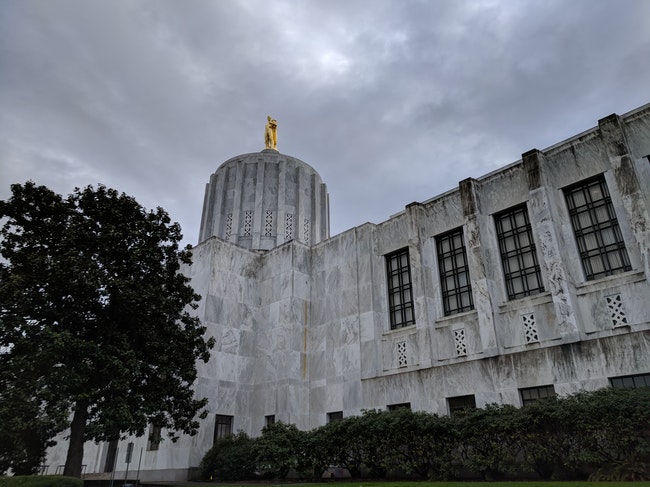 The Oregon Capitol building in Salem. Photo: Chas Hundley
The Oregon Capitol building in Salem. Photo: Chas Hundley
A bill referred to the Oregon speaker’s desk that has yet to be assigned to a committee would raise the state’s minimum wage, currently $11.25 per hour at its lowest, to $17 an hour, which is an annual salary of about $35,000.
Oregon’s minimum wage is implemented on a sliding scale. Employers in the Portland metro area, which includes much of Washington County, but not Gales Creek, are required to pay employees $13.25 an hour. Those in Oregon’s more populous counties outside of the Metro area pay $12/hour, and rural county employers pay $11.50/hour.
House Bill 3351 would do away with regional implementation and set Oregon’s minimum wage at $17 an hour. The legislation would take effect on July 1, 2022.
Oregon’s minimum wage is set to increase again on July 1, 2021, to $14/hour, $12.75/hour, and $12/hour, respective to the above scale.
Incidentally, the federal minimum wage remains at $7.25/hour or an annual salary of about $15,080 and has not increased since 2007
HB 3351 is sponsored by Rep. WInsvey Campos (D-Aloha), Rep. Maxine Dexter (D-Portland), Rep. Dacia Grayber (D-Tigard), Sen. Khanh Pham (D-Portland), and Sen. Deb Patterson (D-Salem). This is the freshman year for all five sponsors, decreasing the bill’s chances of being taken up by the Democratic caucus.
The debate continues over the effects that raising the minimum wage would have on the economy, employment, and inflation. Those against it say higher minimum wages will lead to millions of lost jobs and increased prices for consumer goods while those in favor say the job losses will be relatively low compared to the number of people the change would lift up.
A report released last month by the Congressional Budget Office, a nonpartisan federal agency, estimates hiking the minimum wage to $15 an hour would raise about 1 million Americans out of poverty and positively affect another 27 million. The report also says the cumulative effect would increase the federal deficit by $54 billion through 2031, and the resulting higher prices of goods and services would contribute to increased federal spending.
However, Arindrajit Dube, a professor of economics at the University of Massachusetts, disagrees with the CBO report, saying the methodology used was incorrect and a $15-an-hour increase would lead to less than 500,000 job losses.
The Oregon Center for Public Policy (OCPP) released a portrait of Oregon’s minimum wage workers in December 2019. The report found that more than 360,000 workers have been impacted by Oregon’s minimum wage increases since 2016, that 90 percent of the minimum wage workforce is 20 years old or older, and that less than 10 percent are teenagers — in fact, there are more workers aged 55 or older than teenagers.
One in four earning the minimum wage are parents, and in 2019 those workers earned a full-time salary of $22,880 and $26,000 depending on where in Oregon they live. The OCPP report also says more than half of this workforce works full time, and many of those who do not work full time want to work more hours.
An Oregon Employment Department report finds just 7.2 percent (about 23,800) of jobs in Washington County pay less than $12.50 per hour.
This Forbes.com article takes a deep dive into the argument for and against raising the federal minimum wage.






